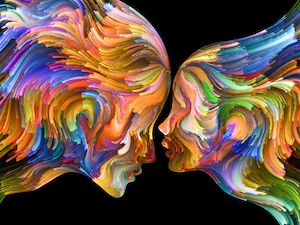Grief
The Grief in Queer Healing
How LGBTQ+ adults can grieve with their younger selves, and why this matters.
Updated June 14, 2023 Reviewed by Lybi Ma
Key points
- The need to grieve is not limited to the loss of loved ones.
- Many LGBTQ+ adults hold unprocessed grief for the loss of the childhood and adolescence they wish they had.
- A way to process this kind of grief is to actively engage the younger queer self.
We often think of grief as the loss of loved ones, but it is also present in many other human experiences.
Grief is the experience of moving through immense pain in response to the loss of something that matters deeply to us. A person. A pet. A future. An experience. It is the pain of longing for what we want to be but cannot be.
Grief and the LGBTQ+ experience
Many LGBTQ+ adults wish things had been different for their younger selves. We grew up in a world that did not allow us to feel safe, free, and able to be all of who we were.

In childhood and adolescence, we accrued deep wounds of shame for feeling different than what the world told us we should be. In response, many of us hid, denied, were unconscious to, or tried to change who we were, and many of us missed out on meaningful experiences our cisgender, straight peers had access to. This leads many of us in adulthood to need a Second Adolescence.
An important, yet often overlooked, part of the healing available in Second Adolescence is truly reckoning with what it was like for our younger selves to grow up in an anti-queer world, and what we wish could have been for them instead. Core to this reckoning is grief.
We must grieve for the childhood and adolescence that wasn’t, and for the wounds of the childhood and adolescence that was. For missing out on beginning to date and explore romantic-sexual relationships with people of the gender we longed for. For not getting that prom date. For not being able to hold hands in the school halls. For not feeling able to be known fully by our friends and family. For suffering from chronic shame and fear. And even for witnessing today’s queer youth having access to more safety, representation, and opportunity than we did.
Many of us are skilled at pushing away painful feelings we don’t want to hold. But if we don’t let grief rise, if we leave it within us unprocessed, it can become a toxin and come out in harmful ways.
We must, instead, actively grieve with and for our younger selves.
How to grieve with and for our younger queer selves

The concept of grieving with and for a younger version of ourselves may feel odd. Doing what's suggested below may evoke feelings of silliness or embarrassment. This can be, however, an effective tool for processing this particular kind of grief. (Notice I said a tool, not the only tool for moving through queer grief. I encourage you to explore with your community or a mental health professional the many ways to process grief.)
1) Reflect on what life was like for your younger self growing up in an anti-queer world. Use thought, journaling, or speaking aloud, to explore such questions as:
What was life like for my younger self in childhood and adolescence? How did they feel about themselves? Were they aware of their queerness or a feeling of being different? What do I wish they could have experienced but didn’t in childhood and adolescence? What do I wish they didn’t have to endure or feel but did? What is it like to see today’s queer youth having access to things their younger selves did not?
2) Visualize an image of your younger self. Bring to mind a particular younger version that you feel pulled to (that is, your 5-year-old self, 12-year-old self, 17-year-old self, and so on). Really let yourself imagine them. To help fill in the image, you could answer such questions as:
What kind of clothing are they wearing? What kind of facial expressions do they make? How do they like to spend their days? What kinds of things are they interested in? What kind of pain do they carry?
Sit with this image. Notice what you feel as you see this Little You. Hold onto this image of your younger self as if you are a living being.
3) Communicate with your younger self about the experience of growing up in an anti-queer world. This can be done either by writing a letter addressed to them or imagining they are sitting in a chair next to you and speaking aloud to them.
- First, hold the image of them in your mind from the previous step. Really let yourself see them and feel their presence.
- Then, share with them what you know about what life is like for them. With statements: “I know you are feeling ________.” “I know the world around you is making you feel _________.” You can acknowledge their pain, fears, hopes, and desires.
- Next, offer the companionship and support they maybe didn’t receive: “It was not okay that the world and people around you made you feel this way.”
- Then, validate their enoughness and goodness: “You are valuable and worthy of all you seek as you are.”
- Next, express what you wished could have been true for them but wasn’t: “I so wish you could have experienced ______.” “I know you secretly dreamed of getting to experience or have ____.” Let yourself share a lot here. Empathize with Little You about how sad and or unjust it was: “It just sucks you weren’t able to experience or have that.”
- Let yourself feel. Notice what comes up as you talk with your younger self in this way. Notice how you feel for them and what you feel with them. Let yourself imagine what it might be like for Little You to hear you saying this to them.
- Lastly, leave them with parting words. You may want to thank Little You for being open to talking with you today, or perhaps let them know you are trying to live a life now they could only dream of. Tell them whatever feels important for you before saying goodbye for now.
Whether through an exercise like the one above or something else, finding ways to be with, express, and move through grief is an important process for LGBTQ+ adults seeking to heal from the impact of anti-queerness.
Healing is a process, a gradual unpacking. Start slow and small. And do it for Little You.




